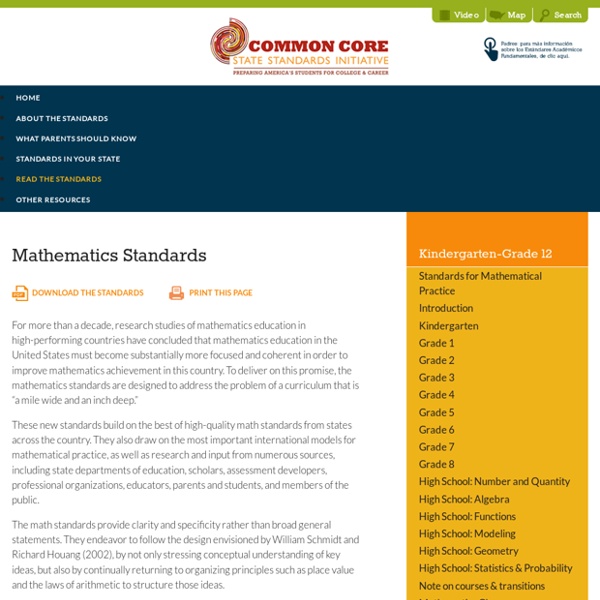10 DEVELOPING PROFICIENCY IN TEACHING MATHEMATICS
Campbell, P.F. (1996). Empowering children and teachers in the elementary mathematics classrooms of urban schools. Urban Education, 30, 449–475. Carpenter, T.P. (1988).
How to Understand Common Core’s Math Methods
Carol R. Rinke;John F. McAdamMay 9, 2016
Common Core State Standards Implementation
Statement of Support for the Common Core State Standards in Mathematics (PDF) In a great act of foresight for this nation, most of the states have now adopted a consistent set of expectations for school mathematics, called the Common Core State Standards. Building on long years of work, the Common Core State Standards are an auspicious advance in mathematics education. They define the mathematical knowledge and skill that students need in order to be ready for college and career, and provide the basis for a curriculum that is focused and coherent.
What’s the Difference: Common Core Math vs. Singapore Mathematics Methods
by Zena Smith In the last several years the landscape of education has changed dramatically. Particularly since the introduction of the Common Core, schools have made big changes to curricular content and teaching methods.
Four Teacher-Recommended Instructional Strategies for Math (Opinion)
(This is the first post in a two-part series.) The new question-of-the-week is: What is the single most effective instructional strategy you have used to teach math? This post is part of a longer series of questions and answers inviting educators from various disciplines to share their “single most effective instructional strategy.” Two weeks ago, educators shared their recommendations when it came to teaching writing.
Showing What We KNOW in Math Journals
5 years ago I took a CGI (Cognitive Guided Instruction) training and loved everything about it. I took in a lot of what I learned and it shaped the way I teach math. CGI is an elementary level mathematics professional development at WCER in the 1980's and 1990's by education professors.
8 Common Core Math Standards, Explained [+ Examples]
The dust has finally settled, and it looks like Common Core math is here to stay. After countless political battles (and more than one Common Core math meme floating around social media), the initiative that incorporates techniques like cooperative learning and active learning has settled into the American education system. Prodigy offers no cost, Common Core-aligned math practice that your students will love.
Math Crosswalk - Resources
Multiple Topics and Multiple Ages Cyberchase. PBS. A lively cartoonish site encourages children to engage in mathematics through games, activities, and videos. Figure This!
Analyzing Student Misconceptions With Proportional Relationships
Common core State Standards Math: Math Practice: Mathematical Practice Standards MP1: Make sense of problems and persevere in solving them.Mathematically proficient students start by explaining to themselves the meaning of a problem and looking for entry points to its solution. They analyze givens, constraints, relationships, and goals. They make conjectures about the form and meaning of the solution and plan a solution pathway rather than simply jumping into a solution attempt. They consider analogous problems, and try special cases and simpler forms of the original problem in order to gain insight into its solution.



